Eighth-year primary class
The program in detail
- Reading
- Writing
- Diction and memorising
- Spelling
- Conjugation
- Grammar
- Vocabulary
- Mathematics - Numbers
- Space
- English
- German
- Geography
- History
- Science
- Computing
- Latin
- Language
- Civilisation
- Arts
- Sports
- Religious education
Reading
- Supervised reading (in class and at home) of books telling full stories, with questions
- Presenting books read at home
- Exercises in explaining texts
Writing
- Continuation of work begun in the seventh-year primary class on writing different texts using various references (a range of literary genres)
Diction and memorising
- Classic and modern poems, theatrical works
- Spoken presentations
Spelling
- Spelling rules studied in class and applied in a range of exercises
- Dictation, followed up with corrections and exercises relating to difficulties encountered
Conjugation
- Simple tenses of the indicative, as well as the perfect tense, present conditional and present imperative
- The subjunctive and other compound tenses
Grammar
- Different sentence types and forms
Recognising the nature of words
- Nouns and noun groups
- Determiners: articles and possessive, demonstrative, numeral and prepositional determiners, and others
- Adjectives and adjectival groups
- Verbs
- Personal pronouns
- Prepositions and noun groups with prepositions
- Adverbs and adverbial groups
Recognising how words or word groups work
- Subjects
- Verb groups including non-prepositional and prepositional verb complements, as well as what follows the verb ‘to be’ (être) and the predicate
- Sentence complements and identifying values (place, time, goal, cause and consequence)
- Noun complements
Vocabulary
- Spelling and using a series of words chosen by theme
- Exercises in semantic vocabulary
Mathematics - Numbers
- Finding locations on a plane and in space
- Natural numbers and operations
- Rational numbers and operations
- Applications
- Multiples and divisors
Space
- Measurements
- Isometry (translation, symmetry, rotation)
- Surfaces and solids
- Areas and volumes
- Problem-solving for learning how to reason, for understanding a number and giving it value, for using the four operations’ properties, for exploring and organising space, for understanding geometric figures and transformations on a plane, and for measuring
Two weekly workshops in mathematical reasoning with help from a student from the EPFL school of technology in Lausanne.
English
- Preparing for the Cambridge ‘Young Learners Flyers Test’ (listening test, reading and writing test, and speaking test)
- Individualised programme for English-speaking pupils based on the ‘Nelson English’ course
Lessons are given in half-groups by a specialist teacher who is a native English-speaker.
One-week stay in England every other year
German
- Using the method ‘Junior – Deutsch für die Romandie – 8. Klasse’ with online learning resource
- Consolidating and deepening knowledge through listening and spoken and written expression
- Topics covered: school subjects, description of the school and a classroom, time, extracurricular activities, holidays and the annual topic chosen by the school
Lessons are given in half-groups by a specialist teacher who is a native German-speaker.
One-week stay in Germany every other year
Geography
- Identifying relations between human activities and how space is organised
- Topics covered: supplies, trade and energy
History
- Identifying how humankind has organised its collective life through the ages
- Periods of history: The Modern Age (15th–18th centuries) and The Contemporary Era (19th and 20th centuries)
Science
- Natural and technical phenomena
- Diversity of the living world
- Human body
- Annual topic chosen by the school
Computing
For a half-year term, pupils are introduced to computer coding through a fun, appealing approach to programming and digital technology whereby they can better understand the world of technology in which they grow up
- Solving enigmas and problems
- Producing creative drawings
- Programming short animated films
- Programming minor video games
Latin
To help them make choices for their secondary education, pupils in the eighth-year primary class receive introductory Latin lessons for a half-year term
Language
- First two declensions (nominative, accusative and singular genitive)
- Five conjugations in the present
- Grammatical mechanisms
- Some vocabulary
Civilisation
- The major periods of Roman history
- Introduction to Roman civilisation (daily life, religion, town planning, etc.)
Arts
- Cultivating an appreciation of artistic activities, stimulating pupils’ creativity and imagination
- Trying out a wide range of techniques: drawing, painting, collage, cutting up, putting together, printing techniques, modelling, etc.
- Using a wide range of materials: paper, cardboard, soil, fabrics, plaster, natural material, etc.
- Introducing art: studying culture by associating names, works of artists, styles and readings
- Making objects and gifts for different events (Christmas, Mother’s Day, etc.)
Artistic activities are taught for half of the year in French and the other half of the year in English by a native English-speaker so that pupils can put into practice points learned in lessons in a less formal setting.
Sports
- Individual and collective games (techniques and tactics)
- Sporting exercises: motor-skills activities, running, jumping, throwing, etc.
- Health and physical condition: warming up, getting muscles ready
- Interpersonal skills: teamwork, pleasure, bravery, sportsmanship, respect for opponents, etc.
Religious education
- Comparative study of the world’s major religions
Toutes les informations pour procéder aux démarches d’admission sont disponibles en ligne :
Admissions






